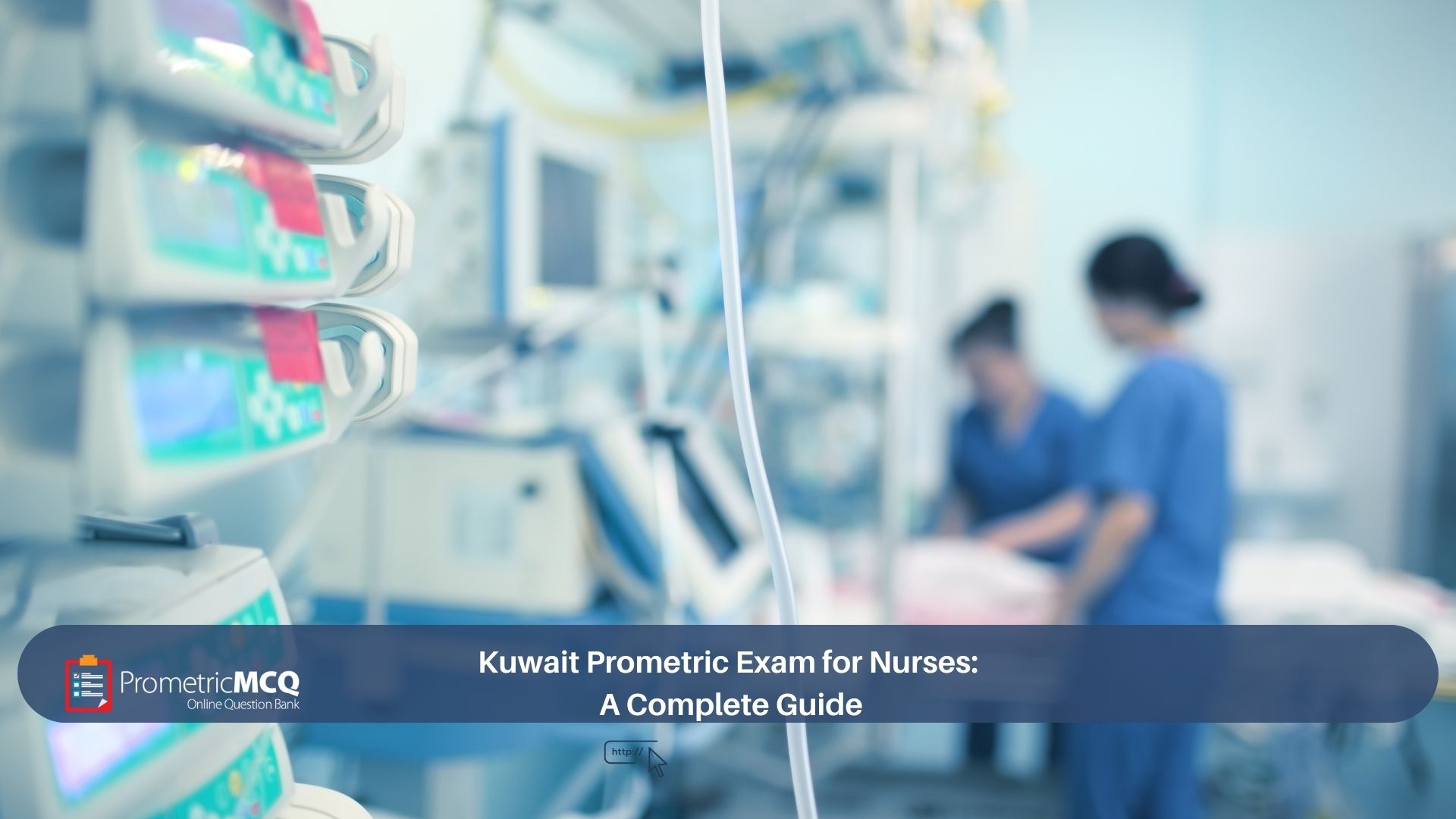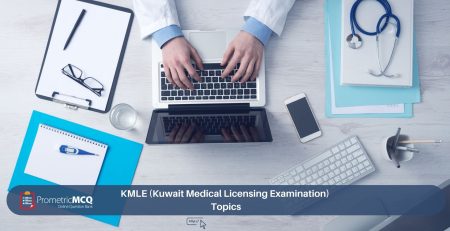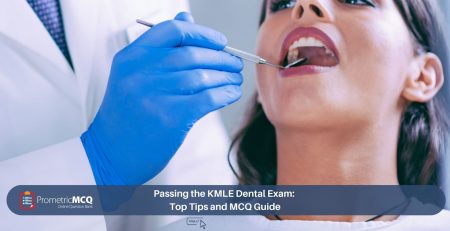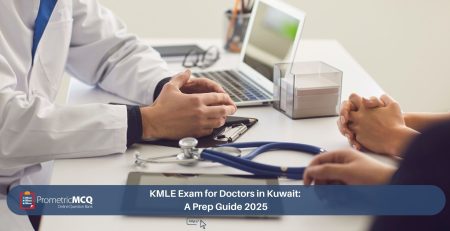
Kuwait Prometric Exam for Nurses: A Complete Guide
fatima@prometricmcq.com2025-09-19T20:27:27+00:00Table of Contents
ToggleKuwait Prometric Exam for Nurses: A Complete Guide (2025)
For nursing professionals seeking to advance their careers on a global stage, the State of Kuwait offers a wealth of opportunities. Its healthcare sector is renowned for its high standards, modern facilities, and commitment to excellence, making it a prime destination for skilled nurses from around the world. The mandatory step to practicing in this esteemed environment is successfully passing the Kuwait Prometric Exam for Nurses, a component of the Kuwait Medical Licensing Examination (KMLE) process. This exam is the definitive measure of a nurse’s competence, ensuring they meet the country’s rigorous standards for patient care and safety.
This is not a simple test of textbook knowledge. The Kuwait Prometric exam is a sophisticated, scenario-based assessment that challenges your clinical reasoning, prioritization skills, and ability to apply the nursing process in a fast-paced, critical thinking environment. Success requires more than just knowing the facts; it demands a strategic, focused, and intelligent approach to preparation. Understanding the exam’s structure, mastering the high-yield topics, and honing your test-taking skills are the pillars of a first-attempt pass.
This comprehensive 2025 guide is your all-in-one resource for conquering the Kuwait Prometric Exam for Nurses. We will provide a deep dive into the exam’s blueprint, a detailed breakdown of the essential syllabus topics, a strategic study plan, and a comprehensive 10-point FAQ section to answer all your questions. Our mission is to equip you with the knowledge, strategy, and confidence needed to excel in the exam and launch your nursing career in Kuwait.
Key Takeaways for the Kuwait Nursing Exam
- Patient Safety is Priority #1: The exam is built around the principle of safe nursing practice. Every question, directly or indirectly, tests your ability to protect the patient.
- Master Prioritization & Delegation: A significant portion of the exam will test your ability to determine which patient needs immediate attention (prioritization) and what tasks can be safely delegated.
- Clinical Application Over Rote Memory: The exam uses clinical vignettes and scenarios. You must be able to apply your knowledge, not just recall isolated facts.
- Pharmacology is Crucial: Flawless medication calculation, knowledge of major drug classes, and understanding the “10 Rights” of medication administration are non-negotiable.
- Core Nursing Fundamentals are Key: A strong foundation in the nursing process (ADPIE), infection control, and ethical principles is essential for success.
Deconstructing the 2025 Kuwait Prometric Exam Blueprint for Nurses
A successful journey begins with a map. Before you begin studying, it’s vital to understand the structure of the exam you’re about to face. The exam is administered by Prometric on behalf of the Kuwaiti Ministry of Health.
Universal Exam Structure for Nurses:
- Format: Computer-Based Test (CBT) consisting entirely of Multiple-Choice Questions (MCQs).
- Question Count: The exam for Registered Nurses typically consists of 70 MCQs.
- Duration: You will have 2 hours (120 minutes) to complete the exam.
- Scoring: The exam is graded on a simple Pass/Fail basis. There is no negative marking, so you must answer every question.
Think of every question as a mini-clinical challenge. The exam is designed to answer one core question: “Is this nurse safe, competent, and capable of making sound clinical judgments in a Kuwaiti healthcare setting?” Let this question guide your entire preparation.
An In-Depth Breakdown of High-Yield Nursing Topics for Kuwait
The KMLE for Nurses covers the full breadth of professional nursing practice. While the syllabus is extensive, a focused approach on these high-yield domains will provide the greatest return on your study time. The most effective way to master these topics is by using a dedicated bank of nursing MCQs.
1. Fundamentals of Nursing
This is the bedrock of your nursing knowledge and is integrated into almost every question.
- The Nursing Process (ADPIE): Be able to apply all five stages—Assessment, Diagnosis, Planning, Implementation, and Evaluation—to clinical scenarios.
- Legal & Ethical Principles: Concepts like informed consent, patient confidentiality (HIPAA principles are a good standard), negligence, malpractice, and patient advocacy.
- Patient Safety: Fall prevention protocols, use of restraints (as a last resort), safe patient handling, and creating a hazard-free environment.
- Documentation: Principles of accurate, timely, and legally sound charting.
- Vital Signs & Basic Care: Interpretation of vital signs, fluid and electrolyte balance, nutrition, and wound care principles.
2. Medical-Surgical Nursing
This is the largest section, covering the management of adult patients with acute and chronic conditions across all body systems.
- Cardiovascular: Management of patients with MI, heart failure, hypertension, and PVD. Interpretation of basic ECG rhythms.
- Respiratory: Care of patients with Asthma, COPD, pneumonia, and post-operative respiratory complications.
- Neurological: Nursing care for patients post-stroke (CVA), with seizures, head injuries, and spinal cord injuries. Use of the Glasgow Coma Scale (GCS).
- Endocrine: Management of diabetes mellitus (including insulin administration, hypoglycemia/hyperglycemia management, DKA), and thyroid disorders.
- Gastrointestinal & Renal: Care for patients with GI bleeding, liver disease, renal failure, and those on dialysis.
3. Pharmacology & Medication Administration
This is a zero-error domain. Your knowledge must be precise and accurate.
- Medication Calculations: You must be 100% proficient in calculating oral dosages, IV drip rates, and infusion pump settings. Practice these until they are second nature.
- The “10 Rights” of Medication Administration: This is a core safety principle.
- Major Drug Classes: Know the mechanism of action, major side effects, and nursing considerations for common drug classes like anticoagulants, antihypertensives, antibiotics, diuretics, and opioids.
- Adverse Reactions: Recognizing and managing allergic reactions, anaphylaxis, and other adverse drug events.
4. Maternal and Child Health (Pediatrics & OB/GYN)
This section tests your knowledge of the care of childbearing families and children.
- Maternity (OB/GYN): Antenatal, intrapartum, and postpartum care. Recognizing obstetric emergencies like hemorrhage and pre-eclampsia. Newborn assessment (Apgar score).
- Pediatrics: Understanding of growth and development milestones, pediatric medication safety (dose calculations are critical), and management of common childhood illnesses like dehydration and respiratory infections.
5. Prioritization, Delegation, and Leadership
These higher-level thinking skills are tested extensively through complex scenarios.
- Prioritization: Use frameworks like Maslow’s Hierarchy of Needs and the ABCs (Airway, Breathing, Circulation) to determine which patient is the most unstable and requires your immediate attention.
- Delegation: Understand which tasks are appropriate to delegate to unlicensed assistive personnel (UAP) or practical nurses. Remember: nurses can delegate tasks, but not the nursing process itself (no assessment, evaluation, or teaching).
Frequently Asked Questions (FAQs) About the Kuwait Nursing Exam
The exam is graded as Pass/Fail, and the official passing percentage is not disclosed by the Ministry of Health. However, the generally accepted benchmark is around 60%. To ensure a comfortable pass, you should aim to consistently score above 70% in your practice mock exams.
While the core nursing content is very similar and based on international standards, there can be subtle differences in emphasis. All exams are heavily focused on patient safety and clinical reasoning. The Kuwait exam for nurses (70 questions in 2 hours) is shorter than the DHA exam (150 questions in 165 minutes), which means pacing is slightly different. For a detailed comparison, you might find our article on differences between DHA and MOH exams useful as it covers similar principles.
The vast majority of the exam is based on universal, evidence-based nursing practice. However, it is always wise to have a basic awareness of professional conduct and ethics as they apply in the region. The focus remains on international standards of patient care. The official Kuwait Ministry of Health website is the best source for any local guidelines.
Primary Source Verification (PSV) is a mandatory process where the DataFlow Group verifies your education, license, and experience directly with the issuing institutions. You must have a positive PSV report to be issued a license. It is a lengthy process, so it is highly recommended to start it at the same time you begin your exam preparation.
The single most effective tool is a high-quality, online question bank (QBank) with practice MCQs that mirror the exam’s style and difficulty. This active learning method is far superior to passively reading textbooks. Look for a QBank with detailed rationales for both correct and incorrect answers.
You must bring your original, valid passport. The name on your passport must exactly match the name you used to register for the exam. No other form of ID is typically accepted. All personal belongings will be stored in a locker provided by the center.
Yes, Prometric allows you to reschedule your exam, but there are strict timelines and fees involved. Rescheduling well in advance (e.g., more than 30 days before) is often free or has a minimal fee. The fee increases significantly the closer you get to your test date. Rescheduling within a few days of the exam may result in forfeiting the entire exam fee.
Candidates are typically allowed a certain number of attempts (usually three) to pass the exam. After failing, you will need to re-apply and pay the fee again to book a new test date. It is critical to analyze why you were unsuccessful and adjust your study strategy before your next attempt.
Direct questions about specific nursing theorists are very rare. However, the principles of these theories (e.g., patient-centered care, promoting independence) are the foundation of the nursing process and are implicitly tested in clinical scenarios. Focus on the practical application of these principles rather than memorizing the theorists’ names.
Finding a comprehensive question bank tailored to the Gulf region’s licensing exams is key to your success. A platform that offers a wide range of questions covering all the topics mentioned in this guide is your best investment. A great place to start is the MCQs Packages page, which offers resources for various specialties.
Conclusion: Your Gateway to a Nursing Career in Kuwait
The Kuwait Prometric Exam for Nurses is a challenging but very passable milestone on your journey to an international nursing career. Success is not about luck; it is the direct result of a strategic, disciplined, and intelligent preparation plan. By understanding the exam’s blueprint, focusing on the high-yield clinical topics, and making active, MCQ-based practice the core of your studies, you are setting yourself up for a first-attempt pass. Embrace the challenge, commit to the process, and you will be well on your way to achieving your professional goals in Kuwait’s prestigious healthcare sector.
Ready to Begin Your Journey to Kuwait?
Our comprehensive nursing question bank is specifically designed to mirror the Kuwait Prometric Exam, with hundreds of high-yield questions, detailed rationales, and timed mock tests to ensure you are fully prepared.










